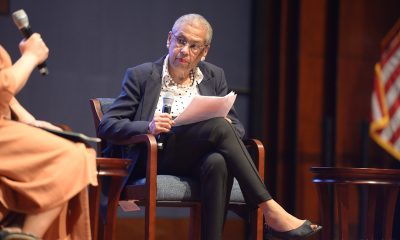District of Columbia
D.C. bill to study trans deaths faces opposition from LGBTQ advocates
Measure calls for creating Medical Examiner committee to identify trends
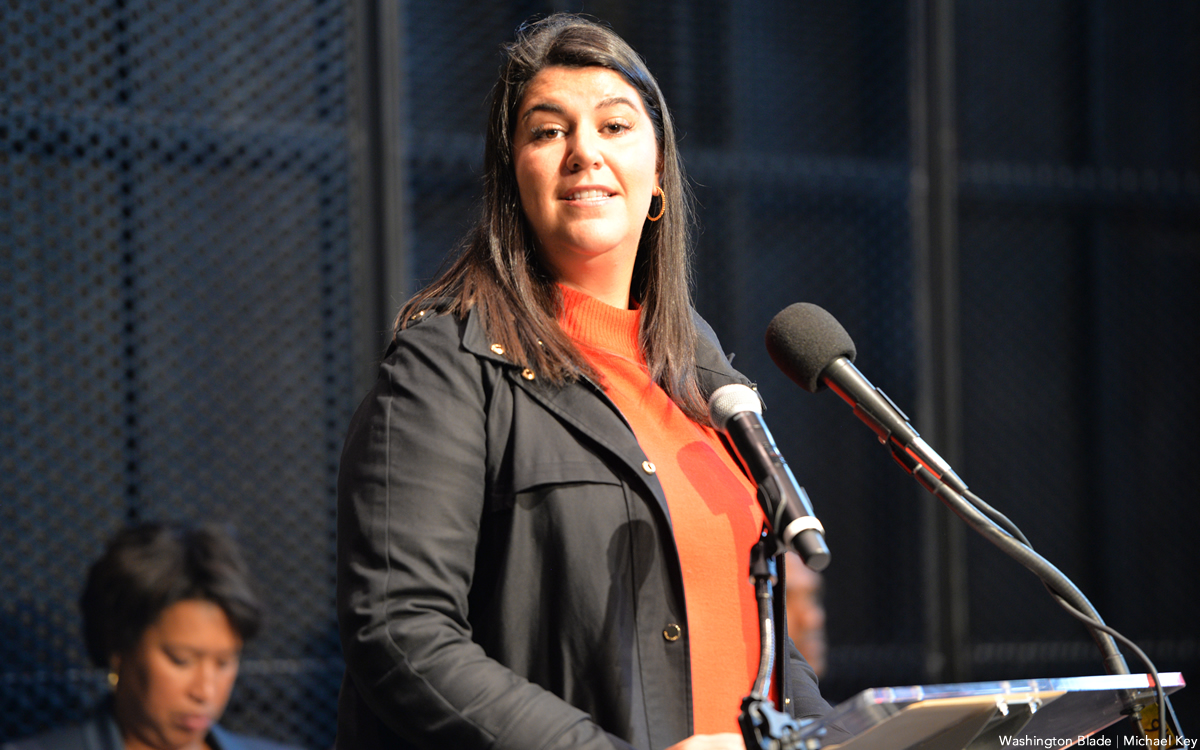
In a little-noticed development, D.C. Council member Brooke Pinto (D-Ward 2) introduced a bill in September 2023 calling for creating a special committee within the D.C. Office of the Chief Medical Examiner to determine and study trends related to the cause of death of transgender and “gender diverse” people in the District of Columbia.
The bill is called the Transgender and Gender Diverse Mortality and Fatality Review Committee Establishment Act. Among other things, it mandates that the medical examiner’s office through the newly created committee “identify and characterize the scope and nature of transgender and gender-diverse mortalities and fatalities, to describe and record any trends, data, or patterns that are observed surrounding transgender and gender-diverse mortalities and fatalities.”
In a development that some observers say caught Pinto off guard, officials with two prominent D.C. LGBTQ supportive organizations – the Whitman Walker Institute and the LGBTQ youth advocacy group SMYAL – expressed strong opposition to the bill in testimony submitted in April as a follow-up to a Council hearing on the bill conducted by Pinto on March 21.
Among other things, the officials – Benjamin Brooks, Whitman-Walker Institute’s Associate Director of Policy and Education; and Erin Whelan, SMYAL’s executive director, said the committee to be created by the bill to identify trans people who die would be an invasion of their and their families’ privacy. The two said the funds needed to pay for identifying whether someone who dies is transgender should be used instead for other endeavors, including supporting trans people in need, and protecting their rights.
The hearing record for the Council’s Committee on the Judiciary and Public Safety, which Pinto chairs and which conducted the hearing, shows that Brooks and Whelan were among four witnesses that testified against the bill. Six witnesses, including officials with the American Foundation for Suicide Prevention and Medical Society of the District of Columbia, testified in support of the bill.
Also testifying in support of the bill with suggested revisions was Vincent Slatt, who serves as chair of the D.C. Advisory Neighborhood Commission Rainbow Caucus.
Jenna Beebe-Aryee, Supervisory Fatality Review Program Manager for the Office of the Chief Medical Examiner, testified that the bill would be “remarkably challenging” for that office and its partnering city agencies to carry out, including what she said would be a difficult process of identifying whether someone who has died is transgender or gender diverse. But she did not state that her office and the Office of the Mayor outright oppose the bill.
The bill has remained in Pinto’s committee since the time of the hearing, with no indication from Pinto of what her plans are for going forward with the bill, including whether she plans to make revisions and if or when she may plan to bring the bill to the full Council for a vote.
Victoria Casarrubias, Pinto’s communications director, told the Blade last week that Pinto’s office had no immediate comment on Pinto’s plans for the bill.
The 17-page bill, according to its introductory summary page, would also “create a strategic framework for improving transgender and gender-diverse health outcomes for racial and ethnic minorities in the District,” and to “recommend training to improve the identification, investigation, and prevention of transgender and gender-diverse fatalities, and to make publicly available an annual report of its findings, recommendations, and steps taken to evaluate implementation of past recommendations.”
The bill authorizes the D.C. mayor to appoint the members of the newly created medical examiner’s committee and requires that members include representatives of six D.C. government agencies, including the Office of the Chief Medical Examiner; the departments of Health; Behavioral Health; Health Care Finance; Human Services; and the Mayor’s Office of LGBTQ Affairs.
It calls on the Office of LGBTQ Affairs to provide support to other city agencies in developing procedures for identifying transgender people who the agencies have provided services for and who have died.
It also requires the mayor to name as committee members representatives of organizations providing health care and services for the transgender community as well as a social worker specializing in transgender related issues and a college or university representative “conducting research in transgender and gender-diverse mortality trends or fatality prevention.”
Seven other members of the 13-member D.C. Council signed on as co-introducers of the bill. They include Council members Robert White (D-At-Large), Anita Bonds (D-At-Large), Christina Henderson (I-At Large), Matthew Frumin (D-Ward 3), Janese Lewis George (D-Ward 4), Charles Allen (D-Ward 6), and Vincent Gray (D-Ward 7).
Spokespersons for Gray and Bonds told the Blade the two Council members continue to support the bill and would consider any revisions that those who have expressed concern about the bill might suggest.
“The establishment of this committee will continue the District’s leading role in LGBTQIA+ advocacy and legislation,” Pinto states in a letter accompanying her introduction of the bill. “The Committee will be the first entity of its kind in the United States,” according to her letter.
Pinto cites in her letter studies and national data showing that deaths of trans people are disproportionately higher due to a variety of causes, including illness compared to cisgender people in the United States. “Trans women in particular are disproportionately vulnerable to the aforementioned risks, as well as to violence and murder, with one in four trans women likely to be victimized by a hate-related crime,” Pinto said in her letter.
“Although data are limited, some studies suggest that transgender people are ‘twice as likely to die as cisgender people’ due to ‘heart disease, lung cancer, HIV-related illness and suicide,’ with trans women being ‘two times as likely to die compared to cis men and ‘three times as likely’ compared to cis women,” Pinto states in her letter.
In their testimony against the bill, Brooks of Whitman Walker and Whalen of SMYAL said the problems they believe the bill will bring about outweigh the benefits that Pinto says it will provide for the trans community.
“It is improper for the District government to be investigating and determining someone’s gender identity,” Brooks said in his testimony. “This would require District agencies to coordinate investigations into deeply personal characteristics of many people,” he said. “This invasion of privacy is a poor use of the government’s time and energy.”
Brooks stated that the city has existing policies and requirements designed to find ways to improve the lives of transgender and gender diverse residents. He pointed to the LGBTQ Health Data Collection Amendment Act of 2018, which requires the Department of Health to produce a comprehensive report on the health and health disparities faced by the D.C. LGBTQ community. According to Brooks, the Department of Health has not released such a report since 2017.
“We strongly recommend that rather than proposing to spend precious time and scarce resources on a novel and invasive committee, the District should put those resources towards fulfilling existing data collection and reporting obligations,” Brooks states in his testimony.
Whelan of SMYAL expressed similar concerns in her testimony. “Transgender and Gender-Diverse (TGD) people do not need yet another violation of their privacy and exposure to more questions and interrogation for them to provide the reasons for the incredible amount of violence and loss the transgender and gender-diverse community faces,” Whelen says in her testimony.
“What we do need are solutions on how to address the underlying causes of anti-transgender violence, in addition to the barriers that prevent transgender and gender-diverse communities from accessing and maintaining safe and stable housing, and accessing affirming mental health resources,” Whelan adds in her testimony. “What we as a community need is diligent action in a positive direction to actually address the lack of resources, services, and violence towards this community.”
Supporters of the bill might point out that it includes strongly worded language calling for keeping personal information about transgender and gender-diverse people who die confidential and calls for criminal penalties for anyone who violates the confidentiality provision by disclosing the information, including whether a deceased person identified as transgender.
Brooks said strong grounds exist for not enacting the bill despite its privacy provision.
“The collection of sensitive information, particularly for decedents who cannot advocate for their own right to privacy, always raises the potential for inappropriate disclosure regardless of potential penalties,” he said. “The threat of criminal prosecution can be a deterrent to the intentional inappropriate sharing of private information; however, it may not stop accidental or inadvertent disclosure,” he said.
Slatt’s testimony calls for six specific suggested revisions in the bill pertaining to ways the newly created medical examiner committee would obtain information about trans people who die, including the suggestion that the Mayor’s Office of LGBTQ Affairs become involved in identifying trans people who pass away and be given one or more additional staff members to help support its increased responsibilities under the legislation.
“Members of the ANC Rainbow Caucus have discussed this proposed bill and find that it is a remarkable and historic step towards addressing trans and gender-diverse mortalities and fatalities,” Slatt says in his testimony.
“At a time when trans and gender-diverse people are under attack by municipalities across the nation, the District of Columbia is setting an example on how to create not just a culture of inclusion, but also a culture of belonging for trans residents,” he stated.
District of Columbia
Eleanor Holmes Norton ends 2026 reelection campaign
Longtime LGBTQ rights supporter introduced, backed LGBTQ-supportive legislation
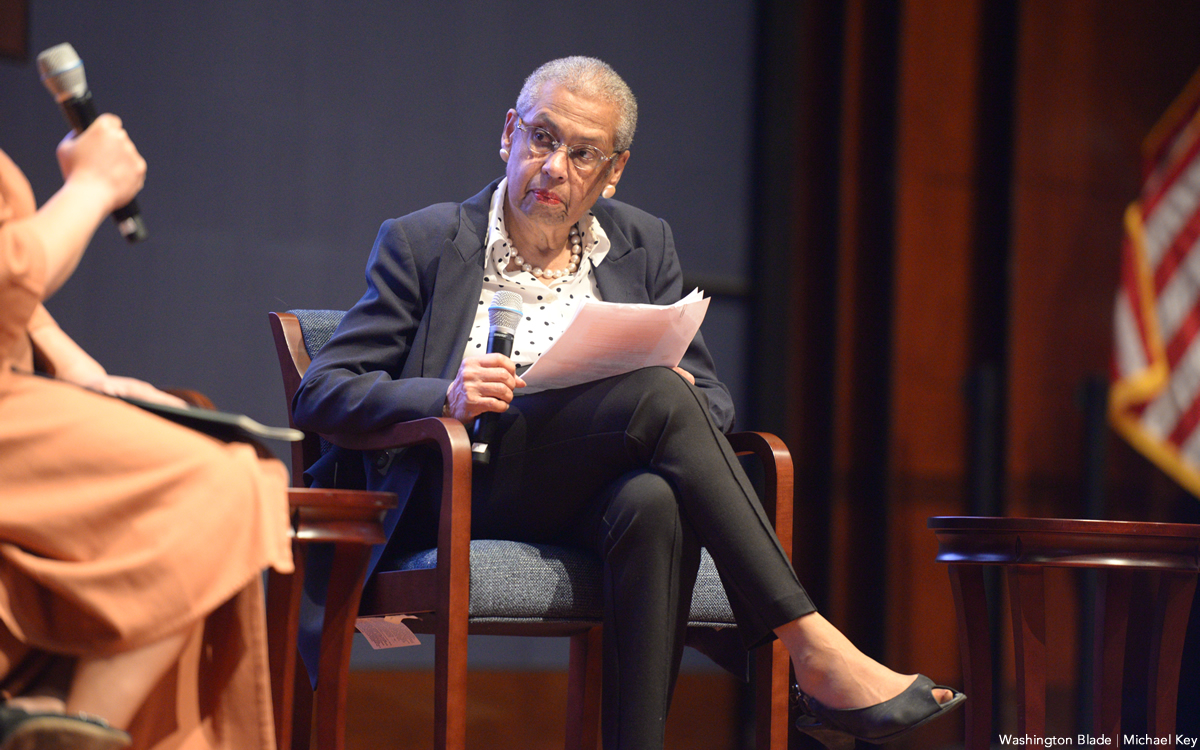
The reelection campaign for D.C. Congressional Delegate Eleanor Holmes Norton, who has been an outspoken supporter of LGBTQ rights since first taking office in 1991, filed a termination report on Jan. 25 with the Federal Elections Commission, indicating she will not run for a 19th term in the U.S. House of Representatives.
Norton’s decision not to run again, which was first reported by the online news publication NOTUS, comes at a time when many of her longtime supporters questioned her ability to continue in office at the age of 88.
NOTUS cited local political observers who pointed out that Norton has in the past year or two curtailed public appearances and, according to critics, has not taken sufficient action to oppose efforts by the Trump-Vance administration and Republican members of Congress to curtail D.C.’s limited home rule government.
Those same critics, however, have praised Norton for her 35-year tenure as the city’s non-voting delegate in the House and as a champion for a wide range of issues of interest to D.C. LGBTQ rights advocates have also praised her longstanding support for LGBTQ rights issues both locally and nationally.
D.C. gay Democratic Party activist Cartwright Moore, who has worked on Norton’s congressional staff from the time she first took office in 1991 until his retirement in 2021, points out that Norton’s role as a staunch LGBTQ ally dates back to the 1970s when she served as head of the New York City Commission on Human Rights.
“The congresswoman is a great person,” Moore told the Washington Blade in recounting his 30 years working on her staff, most recently as senior case worker dealing with local constituent issues.
Norton has been among the lead co-sponsors and outspoken supporters of LGBTQ rights legislation introduced in Congress since first taking office, including the currently pending Equality Act, which would ban employment discrimination based on sexual orientation and gender identity.
She has introduced multiple LGBTQ supportive bills, including her most recent bill introduced in June 2025, the District of Columbia Local Juror Non-Discrimination Act, which would ban D.C. residents from being disqualified from jury service in D.C. Superior Court based on their sexual orientation or gender identity.
For many years, Norton has marched in the city’s annual Pride parade.
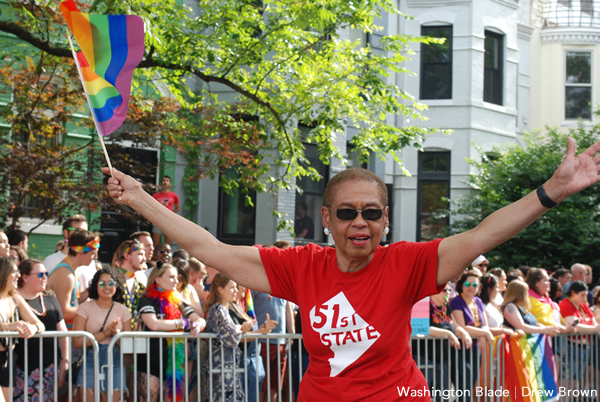
Her decision not to run for another term in office also comes at a time when, for the first time in many years, several prominent candidates emerged to run against her in the June 2026 D.C. Democratic primary. Among them are D.C. Council members Robert White (D-At-Large) and Brooke Pinto (D-Ward 2).
Others who have announced their candidacy for Norton’s seat include Jacque Patterson, president of the D.C. State Board of Education; Kinney Zalesne, a local Democratic party activist; and Trent Holbrook, who until recently served as Norton’s senior legislative counsel.
“For more than three decades, Congresswoman Norton has been Washington, D.C.’s steadfast warrior on Capitol Hill, a relentless advocate for our city’s right to self-determination, full democracy, and statehood,” said Oye Owolewa, the city’s elected U.S. shadow representative in a statement. “At every pivotal moment, she has stood firm on behalf of D.C. residents, never wavering in her pursuit of justice, equity, and meaningful representation for a city too often denied its rightful voice,” he said.
A spokesperson for Norton’s soon-to-close re-election campaign couldn’t immediately be reached for a comment by Norton on her decision not to seek another term in office.
District of Columbia
Judge denies D.C. request to dismiss gay police captain’s anti-bias lawsuit
MPD accused of illegally demoting officer for taking family leave to care for newborn child
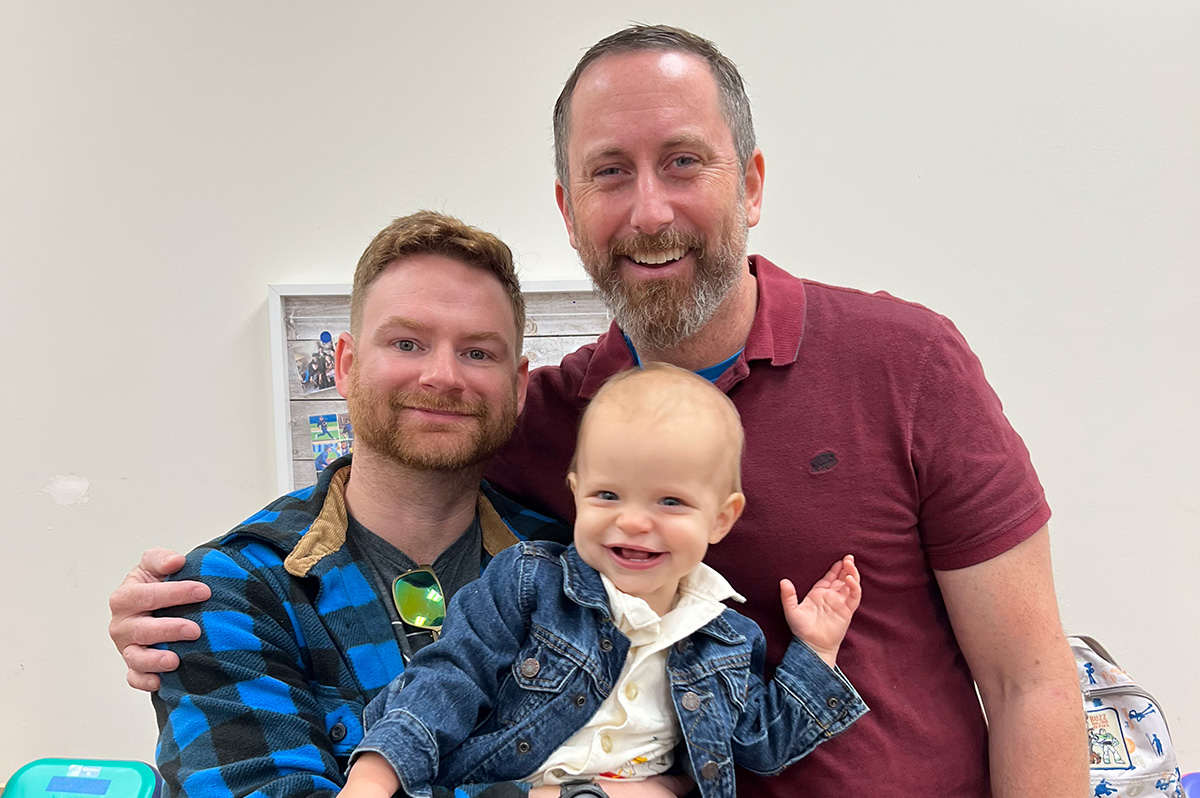
A U.S. District Court judge on Jan. 21 denied a request by attorneys representing the D.C. Metropolitan Police Department to dismiss a lawsuit filed by a gay captain accusing police officials of illegally demoting him for taking parental leave to join his husband in caring for their newborn son.
The lawsuit filed by Capt. Paul Hrebenak charges that police officials violated the U.S. Family and Medical Leave Act, a similar D.C. family leave law, and the Constitution’s Equal Protection Clause by refusing to allow him to return to his position as director of the department’s School Safety Division upon his return from parental leave.
It says police officials transferred Hrebenak to another police division against his wishes, which was a far less desirable job and was the equivalent of a demotion, even though it had the same pay grade as his earlier job.
In response to a motion filed by attorneys with the Office of the D.C. Attorney General, which represents and defends D.C. government agencies against lawsuits, Judge Randolph D. Moss agreed to dismiss seven of the lawsuit’s 14 counts or claims but left in place six counts.
Scott Lempert, the attorney representing Hrebenak, said he and Hrebenak agreed to drop one of the 14 counts prior to the Jan. 21 court hearing.
“He did not dismiss the essential claims in this case,” Lempert told the Washington Blade. “So, we won is the short answer. We defeated the motion to dismiss the case.”
Gabriel Shoglow, a spokesperson for the Office of the D.C. Attorney General, said the office has a policy of not commenting on pending litigation and it would not comment on the judge’s ruling upholding six of the lawsuit’s initial 14 counts.
In issuing his ruling from the bench, Moss gave Lempert the option of filing an amended complaint by March 6 to seek the reinstatement of the counts he dismissed. He gave attorneys for the D.C. attorney general’s office a deadline of March 20 to file a response to an amended complaint.
Lempert told the Blade he and Hrebenak have yet to decide whether to file an amended complaint or whether to ask the judge to move the case ahead to a jury trial, which they initially requested.
In its 26-page motion calling for dismissal of the case, filed on May 30, 2025, D.C. Office of the Attorney General attorneys argue that the police department has legal authority to transfer its officers, including captains, to a different job. It says that Hrebenak’s transfer to a position of watch commander at the department’s First District was fully equivalent in status to his job as director of the School Safety Division.
“The Watch Commander position is not alleged to have changed plaintiff’s rank of captain or his benefits or pay, and thus plaintiff has not plausibly alleged that he was put in a non-equivalent position,” the motion to dismiss states.
“Thus, his reassignment is not a demotion,” it says. “And the fact that his shift changed does not mean that the position is not equivalent to his prior position. The law does not require that every single aspect of the positions be the same.”
Hrebenak’s lawsuit states that “straight” police officers have routinely taken similar family and parental leave to care for a newborn child and have not been transferred to a different job. According to the lawsuit, the School Safety Division assignment allowed him to work a day shift, a needed shift for his recognized disability of Crohn’s Disease, which the lawsuit says is exacerbated by working late hours at night.
The lawsuit points out that Hrebenak disclosed he had Crohn’s Disease at the time he applied for his police job, and it was determined he could carry out his duties as an officer despite this ailment, which was listed as a disability.
Among other things, the lawsuit notes that Hrebenak had a designated reserved parking space for his earlier job and lost the parking space for the job to which he was transferred.
“Plaintiff’s removal as director at MPD’s School Safety Division was a targeted, premeditated punishment for his taking statutorily protected leave as a gay man,” the lawsuit states. “There was no operational need by MPD to remove plaintiff as director of MPD’s School Safety Division, a position in which plaintiff very successfully served for years,” it says.
In another action to strengthen Hrebenak’s opposition to the city’s motion to dismiss the case, Lempert filed with the court on Jan. 15 a “Notice of Supplemental Authority” that included two controversial reports that Lempert said showed that former D.C. Police Chief Pamela Smith put in place a policy of involuntary police transfers “to effectively demote and end careers of personnel who had displeased Chief Smith and or others in MPD leadership.”
One of the reports was prepared by the Republican members of the House Oversight and Government Reform Committee and the other was prepared by the office of Jeanine Pirro, the U.S. attorney for D.C. appointed by President Donald Trump.
Both reports allege that Smith, who resigned from her position as chief effective Dec. 31, pressured police officials to change crime reporting data to make it appear that the number of violent crimes was significantly lower than it actually was by threatening to transfer them to undesirable positions in the department. Smith has denied those claims.
“These findings support plaintiff’s arguments that it was the policy or custom of MPD to inflict involuntary transfers on MPD personnel as retaliation for doing or saying something in which leadership disapproved,” Lempert says in his court filing submitting the two reports.
“As shown, many officers suffered under this pervasive custom, including Capt. Hrebenak,” he stated. “Accordingly, by definition, transferred positions were not equivalent to officers’ previous positions,” he added.
District of Columbia
Faith programming remains key part of Creating Change Conference
‘Faith work is not an easy pill to swallow in LGBTQ spaces’
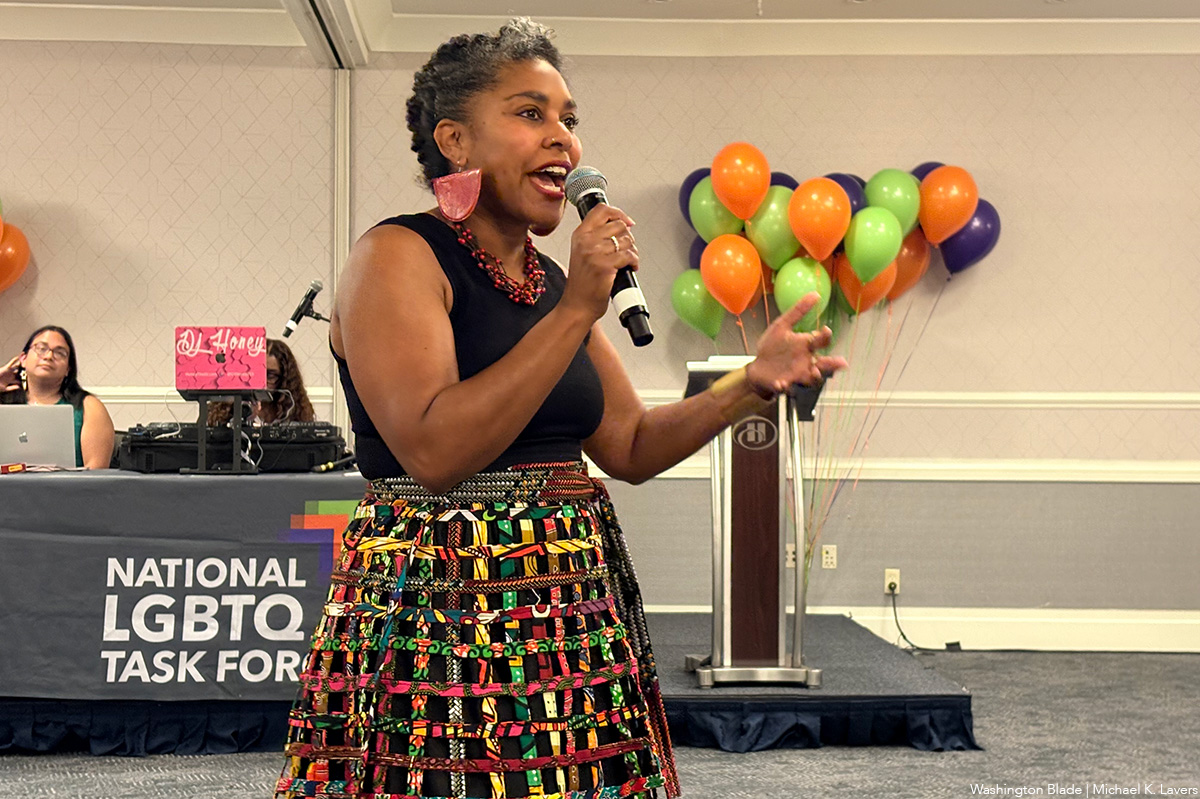
The National LGBTQ Task Force kicked off the 38th annual Creating Change conference in D.C. this week. This year, as with years past, faith and interfaith programming remains a key part of the conference’s mission and practice.
For some, the presence of faith work at an LGBTQ+ conference may seem antithetical, and Creating Change does not deny the history of harm caused by religious institutions. “We have to be clear that faith work is not an easy pill to swallow in LGBTQ spaces, and they’re no qualms about saying that we acknowledge the pain, trauma, and violence that’s been purported in the name of religion,” Tahil Sharma, Faith Work Director for the National LGBTQ Task Force, said.
In fact, several panels at the conference openly discuss acknowledging, healing from, and resisting religious harm as well as religious nationalism, including one scheduled today titled “Defending Democracy Through Religious Activism: A panel of experts on effective strategies for faith and multi-faith organizing” that features local queer faith activists like Ebony C. Peace, Rob Keithan, and Eric Eldritch who are also involved in the annual DC Pride Interfaith Service.
Another session will hold space for survivors of religious violence, creating “a drop-in space for loving on each other in healing ways, held by Rev. Alba Onofrio and Teo Drake.”
But Sharma and others who organized the Creating Change Conference explained that “a state of antipathy” towards religious communities, especially those that align with queer liberation and solidarity, is counterproductive and denies the rich history of queer religious activism. “It’s time for us to make a call for an approach to LGBTQ+ liberation that uses interfaith literacy as a tool rather than as a weapon against us,” Sharma explained.
Recognizing a local queer faith icon
Along with the panels, fighting religious nationalism and fostering communion with aligned faith activists and communities is at heart of this year’s faith work. As Sharma shared, “the person that we’re honoring this year for the faith award is Rev. Dr. Sofía Betancourt, and Dr. Betancourt is an amazing leader and someone who really stands out in representing UUs but also representing herself unapologetically.”
Based in the Washington, D.C. area, Dr. Betancourt has more than 20 years of experience working as a public minister, seminary professor, scholar, and environment ethicist, and public theologian. Her activism is rooted in her lived identities as a queer, multiracial, AfroLatine first-generation daughter of immigrants from Chile and Panama, and has been a critical voice in advancing the United Universalism towards anti-racist and pluralistic faith work.
Creating a faith-based gathering space
Sharma also said that faith fosters a unique space and practice to encounter grief and joy. For this reason, Sharma wants to “create a space for folks to engage in curiosity, to engage in spiritual fulfillment and grounding but also I think with the times that we’re in to lean into some space to mourn, some space to find hope.” The Many Paths Gathering Space serves this purpose, where visitors can stop for spiritual practice, speak with a Spiritual Care Team member, or just take a sensory break from the bustle of the conference.
This also means uplifting and foregrounding queer religious ephemera with an ofrenda to honor those who have passed, a display of nonbinary Korean American photographer Salgu Wissmath’s exhibition Divine Identity, and the Shower of Stoles, a collection of about 1,500 liturgical stoles and other sacred regalia representing the lives of lesbian, gay, bisexual, and transgender people of faith.
The Shower of Stoles
The collection was first started in 1995 by Martha Juillerat and Tammy Lindahl who received eighty stoles that accompanied them and lent them solace as they set aside their ordinations from the Presbyterian Church. The whole collection was first displayed at the 1996 General Assembly of the Presbyterian Church in New Mexico. The stoles, according to the Task Force, “quickly became a powerful symbol of the huge loss to the church of gifted leadership.”
Each stole represents the story of a queer person who is active in the life and leadership of their faith community, often sent in by the people themselves but sometimes by a loved one in their honor. About one third of all the stoles are donated anonymously, and over three-quarters of the stoles donated by clergy and full-time church professionals are contributed anonymously.
The collection shows “not just the deep harm that has been caused that does not allow people to meet their vocation when they’re faith leaders, but it also speaks to how there have been queer and trans people in our [faith] communities since the beginning of our traditions, and they continue to serve in forms of leadership,” Sharma explained.
Explicit interfaith work
Along with creating a sacred space for attendees, hosting workshops focused on faith-based action, and recognizing DC’s rich queer religious history, Creating Change is also hosting explicitly faith services, like a Buddhist Meditation, Catholic Mass, Shabbat service, Jummah Prayer Service, and an ecumenical Christian service on Sunday. Creating Change is also welcoming events at the heart of queer religious affirmation, including a Name/Gender/Pronoun/Identity Blessing Ritual and a reading and discussion around queer bibles stories with Rev. Sex (aka Rev. Alba Onofrio).
But along with specific faith-based programs, Sharma explained, “we’re looking to build on something that I helped to introduce, which was the separation of the interfaith ceremony that’s happening this year which is a vigil versus the ecumenical Christian service which is now the only thing that takes place on Sunday morning.”
This includes an Interfaith Empowerment Service this evening and an Interfaith Institute tomorrow, along with “Sing In the Revolution,” an event where folks are invited “to actually engage in the joy and rhythm of resolution and what that looks like,” Sharma said. One of the key activators behind this work is Rev. Eric Eldritch, an ordained Pagan clergy person with Circle Sanctuary and a member of the Pride Interfaith Service planning committee.
Affirming that queer faith work is part of liberation
The goal for this year, Sharma noted, alongside holding space and discussions about faith-based practice and liberation and intentional interfaith work–is to move from thinking about why faith matters in queer liberation spaces to “how is interfaith work the tool for how we’re engaging in our understanding of de-escalation work, digital strategies, navigating a deeper visioning that we need for a better world that requires us to think that we’re not alone in the struggle for mutual abundance and liberation,” Sharma explained.
It may surprise people to learn that faith work has intentionally been part of the National LGBTQ+ Task Force since its beginning in the 1980s. “We can really credit that to some of the former leadership like Urvashi Vaid who actually had a sense of understanding of what role faith plays in the work of liberation and justice,” Sharma said.
“For being someone who wasn’t necessarily religious, she certainly did have a clear understanding of the relationship between those folks who are allies, those folks who stand against us, and then those folks who sit in between–those folks who profess to be of religious and spiritual background and also are unapologetically LGBTQ+,” he continued.
This year’s faith programming builds on this rich history, thinking about “a way to kind of open doors, to not just invite people in but our people to go out into the general scene of the conference” to share how faith-based work is a tool, rather than a hindrance, to queer liberation work.



